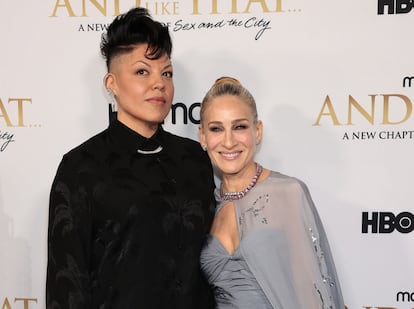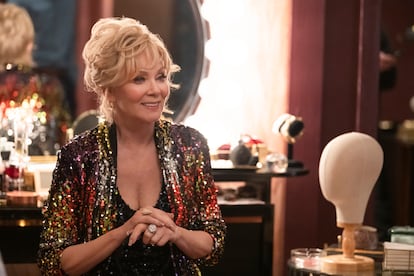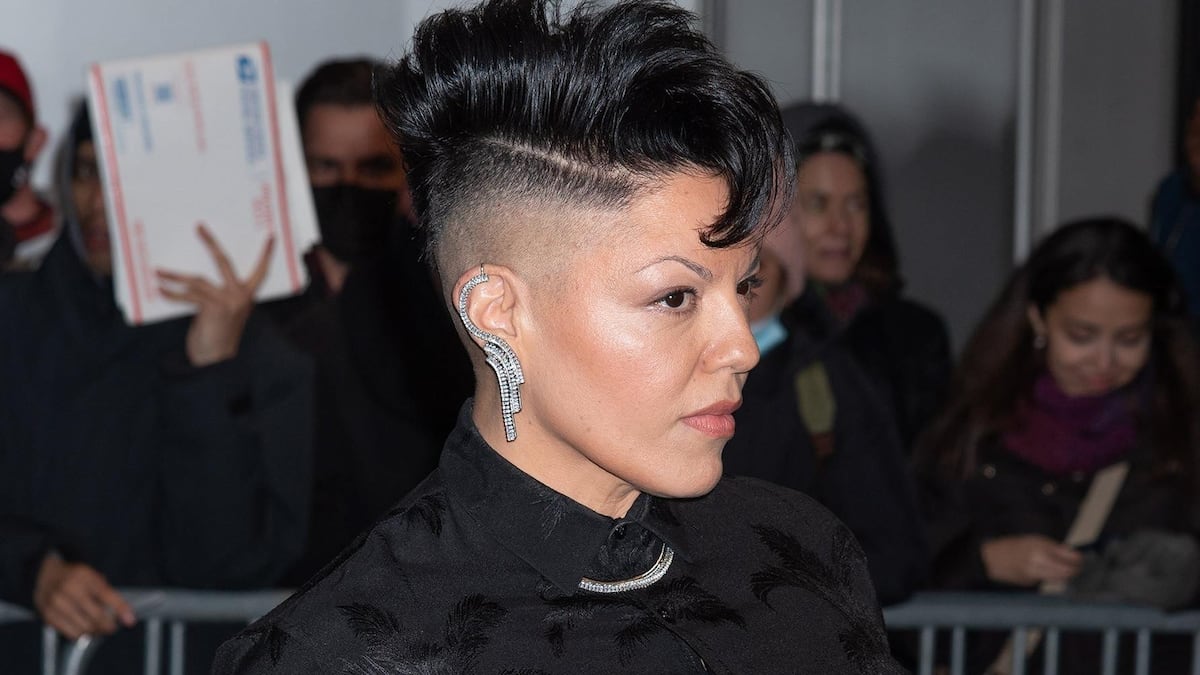Why no one loves Che Díaz, the most controversial character in ‘And Just Like That’
The ‘Sex and the City’ reboot has come to an end with one character in the spotlight: a non-binary, pansexual comedian who was meant to address the lack of diversity on the series. Instead, they have become one of the most disliked names of 2022 so far

Of all The Simpsons’ best takes, perhaps the cleverest was a dog named Poochie. In an episode originally aired on February 9, 1997, the Itchy & Scratchy Show became the Itchy & Scratchy & Poochie Show. Itchy and Scratchy were a hyper-violent Tom and Jerry ripoff, and the premise of the episode was the cartoon gaining a “cool” character to reach a new audience. Poochie was a rapping dog who reminded the audience to recycle garbage. Wearing sunglasses, a backwards baseball cap and jeans, Poochie wanted to be radically hip, but only succeeded in getting viewers to hate him. The producers of the series killed him off after one episode. Poochie was a symbol of what happens when shows take shortcuts to redeem themselves from irrelevance. And today’s Poochie is And Just Like That’s Che Díaz, as portrayed by Sara Ramirez.
After six seasons and two movies, the Sex and the City reboot’s premiere was the most-watched in the history of HBO Max, and has come to an end after 10 episodes. Latinx, pansexual, non-binary and a stand-up comedian (they record a special for Netflix during the show), Ramirez’s character was supposed to redeem a series long accused of being too white, rich, heteronormative and cisgender (although in the late 1990s four women talking about fellatio or menstruation was groundbreaking). Che is not the only face of diversity: Black, Asian and Hindu characters are also present, and it is revealed that Rose, Charlotte’s child, now wants to be known as Rock. However, it is Che who has taken social media by storm with memes, while media including the Los Angeles Times, Vulture, Rolling Stone and the Daily Beast have dedicated pieces to analyzing why so many people hate the character.
The criticism has been unrelenting. “There is no exaggerating how insufferable this character is. To call them unwatchable is not hyperbole. ‘Cringing’ is not a strong enough verb to describe what the body reflexively does when they are on screen, like a physical defense mechanism… No one wants to single out the only new LGBTQ+ character on a series as the worst. Yet Che Díaz leaves us no choice,” wrote Kevin Fallon in the Daily Beast. Jackson McHenry was slightly more sympathetic in Vulture: “It’s easy to dismiss Che because the character has been written as this jumble of traits to serve a bunch of plot purposes… Che provides some of the reboot’s more embarrassing scenes, the kind that are necessary for the sort of social awkwardness that the original series thrived on.”
First, the character doesn’t seem to satisfy either new or legacy audiences. Young people spy an update of Poochie who tries to push all the buttons of woke culture simultaneously. While viewers who enjoyed the series in its day find the character unsympathetic and condescending. Che Díaz should mean representation, but the poorly drawn character may actually work against greater diversity onscreen, some argue. “Che Díaz is gonna get gay rights taken away from us,” joked playwright Matthew K. Begbie on Twitter. Another tweet went even further: “Che Díaz is our 9/11.” “You just know not a single functioning queer was consulted when they concocted Che Díaz in the writing room,” wrote comedian Charlie Lewin. In fact, the And Just Like that writers’ room was composed mostly of women of different races, including LGBTQ+-identifying people. And Ramirez themself (who came out as a non-binary person in August 2020) told The Hollywood Reporter last December they were advised by GLAAD, the Gay & Lesbian Alliance Against Defamation, in building their character.
“We have to ask creators for honesty. If you want to put a non-binary character in your series, have it written by a non-binary writer,” said Enrique Aparicio, a non-binary cultural journalist, and one half of the podcast show ¿Puedo hablar? (Can I speak). “They will be able to create a much more faithful portrait of the non-binary experience than a table of the best cis scriptwriters on the planet. And if you just want to throw in a non-binary character because it looks hip, you’re using our identities to add social capital to your work without any real knowledge of our experience.”
Hey! It’s Che Diaz! pic.twitter.com/eFfPXkMeyr
— sam greisman (@SAMGREIS) January 3, 2022
Estíbaliz “Esty” Quesada, a non-binary Youtuber, writer and actor, said tokenism was the issue. “I like the idea of a non-binary character appearing in the series; it’s necessary to bring these realities into fiction,” they said. “Che Díaz makes it clear from minute one what they are. But then they don’t know how to talk about anything else. They become a parody of a social vigilante who repeats woke terms like a souped-up algorithm. With Che Díaz they want to check all the boxes at once: POC, non-binary gender, polyamory, activism... and it’s exhausting. They are a character who seems to have no life or existence beyond social media. Non-binary people have lives that are just as complicated as everyone else’s. Our gender is a footnote, not our epicenter.”
Regarding the dilemma of whether an LGTBQ+ character has to be sympathetic to provide positive visibility, Aparicio argued: “It would be great if there could be villainous non-binary characters without it being a debate, but I don’t think enough time has passed. We come from centuries of negative queer coding (how many Disney villains are akin to drag queens?) and it’s too soon for a queer bad guy not to be judged by their queerness rather than their behavior.”

Visibility without clichés
“On streaming platforms, you get the sense that they are way ahead with diversity, but I have never been told ‘your cast is too white,’ ‘too straight’ or ‘too rich’,” explained Antuña, a screenwriter and executive producer behind series such as El Vecino (The Neighbor), García and Sin Huellas (Without a Trace). “In some cases they have indeed asked us to take care of the proper representation, without falling into clichés, but as a creator that concern has to be yours beforehand.” According to Antuña, what raises the viewer’s eyebrow is when “you try to put everything in.” She explained: “There are areas of Spain where the local migrant population is almost exclusively sub-Saharan African, and there are hardly any Latinos or Asians. If all these groups are represented at once you are building a strange mosaic, which local viewers do not recognize because it is not real. If your gang is all straight, white, Spanish men, you’re leaving out a very large part of the world. But if your gang has a black woman, a Latino, a disabled woman, a lesbian, a trans man and someone non-binary, it’s nobody’s gang either, it’s an advertisement.”
A few have come to Che Díaz’s defense. Rolling Stone magazine dedicated a column to them and celebrated their presence as representing not a collective, but the opposite of what Sex and the City always was: the trials and tribulations of four white, privileged, heterosexual women. Sara Ramirez defended her character when they met with journalists to promote the series: “We have built a character who is a human being, who is imperfect, who’s complex, who is not here to be liked, who’s not here for anybody’s approval. They’re here to be themselves.” In Spain, the comments about Che in a Facebook post of the magazine Fotogramas show that society still considers inclusive language for non-binary – such non-gendered adjectives in the case of Spanish – an object of ridicule: “It’s absurd, ridiculous and stupid,” wrote one viewer.
The question of laughs
There is another uncomfortable issue regarding Che: their character is supposed to be a kind of comedy legend, with a special on Netflix and invites to host fundraisers on the Upper East Side. But when Che begins their routines on stage, only the assembled characters laugh because that’s what the script is telling them to do. Even Rolling Stone, in the article which defends the character, calls the show they perform in episode three “staggeringly unfunny.”

Asked if there is an added risk in trying to make humor sobering and even moralistic, Xavi Puig, creator and director of the Spanish satirical newspaper El Mundo Today, explained: “If the public is mainstream and the humor alludes to things that are not yet established in the common imagination, you will lose part of the audience and gain the loyalty of another. But I am in favor of taking that risk, because the mainstream gradually catches up with the new and that’s how we evolve. Fiction has to work on its own, as without that meaning it becomes a slave to the language and subject matter of the majority.”
Paloma Rando, a scriptwriter and EL PAÍS television columnist, believes that “Che is a preachy character, without conflict and without weaknesses. Their monologues do not primarily seek to make people laugh, but to make them reflect. They are a preacher with more or less funny jokes, not a comedian with good intentions, and nobody likes to be preached at.” Rando points to other shows where today’s self-conscious humor is pitted against the dark comedy of yesteryear more successfully, such as Hacks (also on HBO). “It’s always irritating when someone lectures you, but all series and movies carry a message. Whether it’s subtle is another thing,” added Antuña.
Che Díaz will leave a strange legacy: irritating for some, but perhaps revelatory for millions of viewers over 50 confronted with non-normative sexual and social realities in the context of a beloved series. Michael Patrick King, the character’s creator, told Variety he believes all the backlash against Che is because she is Miranda’s conduit to divorce her husband, Steve. “What everybody else is projecting on that character has a lot to do with what they want to have happen to Miranda in the story. It has so little to do with Che.”
Tu suscripción se está usando en otro dispositivo
¿Quieres añadir otro usuario a tu suscripción?
Si continúas leyendo en este dispositivo, no se podrá leer en el otro.
FlechaTu suscripción se está usando en otro dispositivo y solo puedes acceder a EL PAÍS desde un dispositivo a la vez.
Si quieres compartir tu cuenta, cambia tu suscripción a la modalidad Premium, así podrás añadir otro usuario. Cada uno accederá con su propia cuenta de email, lo que os permitirá personalizar vuestra experiencia en EL PAÍS.
¿Tienes una suscripción de empresa? Accede aquí para contratar más cuentas.
En el caso de no saber quién está usando tu cuenta, te recomendamos cambiar tu contraseña aquí.
Si decides continuar compartiendo tu cuenta, este mensaje se mostrará en tu dispositivo y en el de la otra persona que está usando tu cuenta de forma indefinida, afectando a tu experiencia de lectura. Puedes consultar aquí los términos y condiciones de la suscripción digital.











































